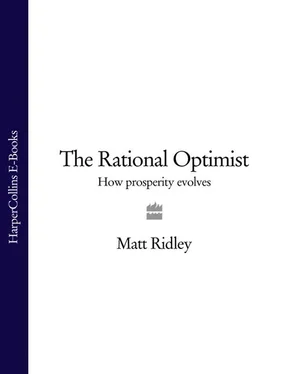For instance, as evolutionary psychologists confirm, sometimes the motivation behind conspicuous displays of virtue by the very rich are far from pure. When shown a photograph of an attractive manand asked to write a story about an ideal date with him, a woman will say she is prepared to spend time on conspicuous pro-social volunteering. By contrast, a woman shown a photograph of a street scene and asked to write about ideal weather for being there, shows no such sudden urge to philanthropy. (A man in the same ‘mating-primed’ condition will want to spend more on conspicuous luxuries, or on heroic acts.) That Charles Darwin’s wealthy spinster aunt Sarah Wedgwood’s funding of the anti-slavery movement (she was the movement’s biggest donor) may have a hint of unconscious sexual motives, is a charming surprise. But it does not detract from the good she did, or from the fact that commerce paid for that good.
This applies among the poor as well as the rich. The working poor give a much higher proportion of their income to good causes than the rich do, and crucially they give three times as much as people on welfare do. As Michael Shermer comments, ‘Poverty is not a barrier to charity, but welfare is.’ Those of libertarian bent often prove more generous than those of a socialist persuasion: where the socialist feels that it is government’s job to look after the poor using taxes, libertarians think it is their duty. I am not saying that the market is the only source of charity. Clearly not: religion and community provide much motivation to philanthropy too. But the idea that the market destroys charity by teaching selfishness is plainly wide of the mark. When the market economy booms so does philanthropy. Ask Warren Buffett and Bill Gates.
It is not just cruelty and indifference to the disadvantaged that have retreated with the spread of the collective brain. So has illiteracy and ill health. So has crime: your chances of being murdered have fallen steadily since the seventeenth century in every European country, but once again beginning with the trade-mad Holland and England. Murder was ten times as common before the industrial revolution in Europe, per head of population, as it is today.The fall in crime rates turned into a plummet at the turn of the twenty-first century – and use of illegal drugs fell too. So has pollution, which was far worse under communist regimes than in the free-market, democratic West. There is now a pretty well established rule of thumb (known as the environmental Kuznets curve) that when per capita income reaches about $4,000, people demand a clean-up of their local streams and air. Universal access to education came about during a time when Western societies were unusually devoted to free enterprise. Flexible working hours, occupational pensions, safety at work – all of these improved in the postwar West because people were enriching themselves and demanding higher standards, as much as because higher standards were imposed on recalcitrant firms by saintly politicians; the decline in workplace accidents was just as steep before the occupational safety and health act as after it. Again, some of these trends might have happened anyway, without the commercialisation of life, but don’t bet on it. The taxes that paid for sewers were generated by commerce.
Commerce is good for minorities, too. If you don’t like the outcome of an election you have to lump it; if you don’t like your hairdresser, you can find another. Political decisions are by definition monopolistic, disenfranchising and despotically majoritarian; markets are good at supplying minority needs. The other day I bought a device for attaching a fly-fishing rod to my car. How long would I have had to wait in 1970s Leningrad before some central planner had the bright idea of supplying such a trivial need? The market found it. Moreover, thanks to the internet, the economy is getting better and better at meeting the desires of minorities. Because the very few people in the world who need fishing rod attachments or books on fourteenth-century suicide can now find suppliers on the web, niches are thriving. The ‘long tail’ of the distribution – the very many products that are each wanted by very few, rather than vice versa – can be serviced more and more easily.
Freedom itself owes much to commerce. The great drive to universal suffrage, religious tolerance and female emancipation began with pragmatic enthusiasts for free enterprise, like Ben Franklin, and was pressed forward by the urban bourgeoisie as a response to economic growth. Right into the twentieth century tsars and general secretaries found it an awful lot easier to dictate a tyranny of peasants than a demos of bourgeois consumers. Parliamentary reform began in Britain in the 1830s because of the grotesque under-representation of the growing manufacturing towns. Even Marx was subsidised by Engels’s father’s textile mill. It was the now-unfashionable philosopher Herbert Spencer who insisted that freedom would increase along with commerce. ‘My aim,’ he wrote in 1842 (anticipating John Stuart Mill by nine years), ‘is the liberty of each limited alone by the like liberty of all.’ Yet he foresaw that the battle to persuade leaders not to believe in coercion was far from over: ‘Though we no longer coerce men for their spiritual good, we still think ourselves called upon to coerce them for their material good: not seeing that the one is as unwarrantable as the other.’ The inherent illiberalism of the bureaucracy, not to mention its tendency to corruption and extravagance, was a threat Spencer warned against in vain.
A century later, the gradual dismantling of apartheid and segregation was helped by commercialisation, too. The American civil rights movement drew its strength partly from a great economic migration. More African-Americans left the South between 1940 and 1970 than Poles, Jews, Italians or Irish had arrived in America as immigrants during their great migrations. Lured by better jobs or displaced by mechanical cotton pickers, black share-croppers came to the cities of the industrial North and began to discover their economic and political voice. They then began to challenge the system of prejudice and discrimination they had left behind. The first victory along that road was an exercise in consumer power – the Montgomery bus boycott of 1955–6.
The sexual and political liberation of women in the 1960s followed directly their domestic liberation from the kitchen by labour-saving electrical machinery. Lower-class women had always worked for wages – tilling in fields, sewing in sweatshops, serving in parlours. Among the upper-middle classes, though, it was a badge of rank, handed down from the feudal past, to be or to have a non-working (or at least housekeeping) wife. In the 1950s many suburban men, returning from war, found they too could afford such an accessory, and many women were pressured into giving their battleship-welding jobs back to men. In the absence of economic change, that is probably how it would have stayed, but soon the opportunities to work outside the home grew as the time spent on increasingly mechanised housework dwindled, and it was this, as much as any political awakening, that enabled the feminist movement to gain traction in the 1960s.
The lesson of the last two centuries is that liberty and welfare march hand in hand with prosperity and trade. Countries that lose their liberty to tyrants today, through military coups, are generally experiencing falling per capita income at an average rate of 1.4 per cent at the time – just as it was falling per capita income that helped turn Russia, Germany and Japan into dictatorships between the two world wars. One of the great puzzles of history is why this did not happen in America in the 1930s, where on the whole pluralism and tolerance not only survived the severe economic shocks of the 1930s, but thrived. Perhaps it nearly did happen: Father Coughlin tried, and had Roosevelt been more ambitious or the constitution weaker, who knows where the New Deal might have led? Perhaps some democracies were just strong enough for their values to survive. Today there is much argument about whether democracy is necessary for growth, China seeming to prove that it is not. But there can be little doubt that China would – indeed may yet – see either more revolution or more repression if its growth rate were to fall to nothing.
Читать дальше












